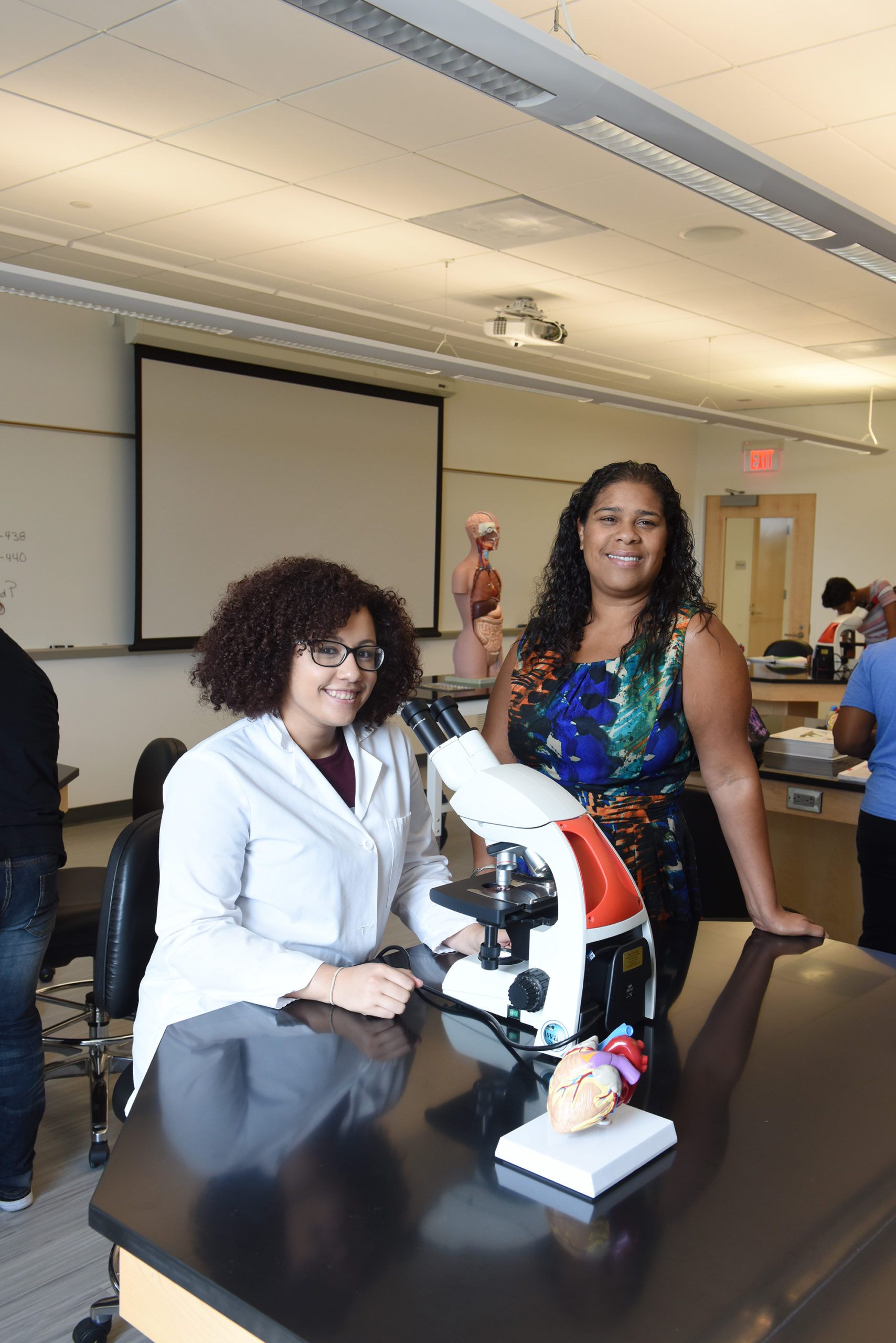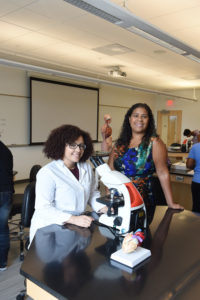
Trinity Washington University Receives $1 Million Grant from Howard Hughes Medical Institute to Support Women of Color in Science
NOTE: Trinity announced this exciting news in early summer, and some of you may have missed it. With the start of the fall semester, Trinity is very pleased to share this big news with new and returning students! What a fantastic way to start the new academic year!
Trinity One of Just 24 Colleges and Universities Nationwide Selected for First Round of Institute’s New Inclusive Excellence Initiative
 June 7, 2017… The Howard Hughes Medical Institute (HHMI), the largest private, nonprofit supporter of science education in the United States, selected Trinity Washington University to receive a $1 million grant to increase the retention and success of women of color, women from low income areas and first generation students pursuing science majors.
June 7, 2017… The Howard Hughes Medical Institute (HHMI), the largest private, nonprofit supporter of science education in the United States, selected Trinity Washington University to receive a $1 million grant to increase the retention and success of women of color, women from low income areas and first generation students pursuing science majors.
Trinity is one of only 24 schools, and the only women’s college, selected in HHMI’s Inclusive Excellence initiative, a new program that aims to increase the capacity of colleges and universities to effectively engage all students so they can be successful in science, especially undergraduates who enter four-year institutions via nontraditional pathways.
“Trinity is deeply honored to be selected by the very prestigious Howard Hughes Medical Institute to increase the success of women of color in the sciences,” said President Patricia McGuire. “Trinity is one of the nation’s historic women’s colleges and our commitment to encouraging women to succeed in science goes back to our founding in 1897. With this new project, Trinity’s science faculty have created an exemplary initiative that builds on their remarkable commitment to our students and to mentoring and supporting women of color to excel in science.”
Trinity’s program, ExCEL (Experience x Confidence Equals Leadership), is designed to increase the retention and success of women of color, women from low income areas and first generation students entering science majors by improving student confidence, sense of belonging, self-efficacy and well-being through mentored experiential learning opportunities.
“We’re building on the successes we have had with our science students,” said Dr. Cynthia DeBoy, associate professor of biology and the principal author of the grant. “We have mentored our students and encouraged them to apply for research opportunities and present at conferences, and they have inspired us with their achievements. We assessed what has worked and will be applying it on a larger scale.”
“We’re committed to exposing our students to authentic research at the undergraduate level,” said DeBoy, “and we believe that the power of experiential learning is transformational for our students. I am very fortunate to work with outstanding science faculty who are dedicated to the academic success of our students. We worked on this grant proposal as a team, using a very collaborative process, and that dynamic will be a hallmark of this new initiative.”
With the HHMI grant, Trinity’s faculty will develop and implement a holistic science curriculum in which a strong mentorship program comprised of Mentor Circle courses will support students academically and socially as they participate in research communities at Trinity and acquire external research opportunities. HHMI will support Trinity’s capacity to include all students in valuable research opportunities by purchasing necessary scientific equipment to conduct authentic research within the curriculum and to expand a network for external research opportunities.
Faculty training and workshops will be a major component of the program, and will include Trinity faculty from all disciplines, with a focus on mentoring and experiential learning. “Trinity has a strong commitment to the liberal arts, which means that our science students are taking classes in English, history and psychology,” said DeBoy. “It’s important for science majors to have positive academic experiences throughout the curriculum – that strengthens them as successful, confident scholars.”
Trinity is well positioned to build a model program that fulfills the purposes of the HHMI initiative. Recently designated as a Predominantly Black Institution by the U.S. Department of Education, Trinity now educates a remarkably diverse student population; more than 90% of Trinity’s students are African American and Latina. With a long history of success in the sciences, Trinity graduates have made their mark in government laboratories and private business, in medicine and other scientifically-related fields as well as teaching in schools, colleges and universities. Trinity is just one of 13 institutions nationally designated to be part of the Clare Boothe Luce Program to advance women in the STEM disciplines. With the recent opening of the Payden Academic Center on campus, Trinity has new science laboratories equipped with state-of-the-art technologies to support innovative pedagogies that engage students in active learning in the science disciplines, enhancing the opportunities for student success and mastery of even the most complex topics.
HHMI challenged schools to identify the reasons students are excluded from science and find new ways to include students in opportunities to achieve science excellence. In particular, the HHMI initiative focuses on those undergraduates who come to college from diverse backgrounds and pathways. These new majority students include under-represented ethnic minorities, first-generation college students, and working adults with families.
During the rigorous two year process to apply for an award, schools were asked to take a hard look at their own student data and examine institutional and faculty practices that could be excluding students from STEM. Then, each school developed a plan to address problems it had identified involving inclusivity in STEM on its campus.
“We’re thinking differently about how HHMI can help move science education forward,” said HHMI President Erin O. Shea. “The challenges this program addresses are important for all of us who care deeply about developing a more inclusive and diverse scientific community.”
Trinity Media Contact: Ann Pauley, pauleya@trinitydc.edu, 202-884-9725
- HHMI News Release: 24 Institutions Commit to Diversity and Inclusion Through 2017 HHMI Inclusive Excellence Initiative
- Compoanion Essay by David Asai, HHMI Senior Director for Science Education: A New Strategy to Build Capacity for Creativity